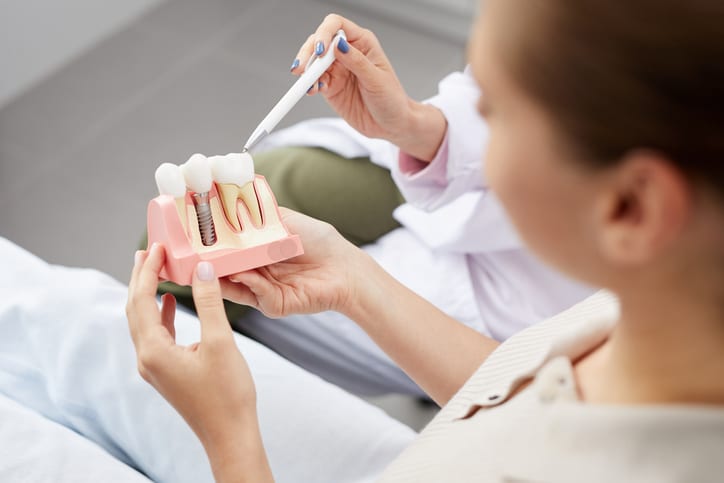10 Reasons Your Rockford Dentist May Recommend Dental Implants

Introduction
Losing one or more natural teeth can be devastating. Your smile and ability to chew and speak properly feels compromised. You may need to rely on unsatisfactory bridges, dentures, or something to fill those gaps in your smile. But your dentist likely has a more permanent, natural-looking solution – dental implants. These small titanium-rooted devices surgically integrate with the jawbone, securely anchoring replacement teeth in comfort and confidence.
If dental implants are recommended to restore missing teeth, your dentist sees you as an ideal candidate. For several reasons, implants may be the best option for renewing your smile. This life-changing treatment could correct issues you’ve struggled with for years. Learn ten key reasons your Rockford dentist may advise dental implants.
1. You Have Missing Teeth
- Suppose you are missing one or more permanent teeth due to injury, decay, or periodontal disease; your dentist will likely consider dental implants an option. Missing teeth can negatively impact your oral health and quality of life in many ways. Without a tooth root, the bone in the jaw begins to deteriorate. Bone loss can then cause changes to your face shape and the collapse of surrounding teeth. This makes your remaining natural teeth more susceptible to decay. Missing teeth also remove some of your biting and chewing capacity, making eating challenging.
- Dental implants can be the ideal restorative solution for missing teeth because they replace the entire tooth down to the root. The titanium implant fuses with the jawbone, halting bone loss at the site. A connecting abutment and lifelike porcelain crown are attached to the implant post to replicate a natural tooth. Unlike traditional bridges, which require shaving down adjacent healthy teeth for crowns to anchor the bridge, implants stand independently.
- They prevent unnecessary reduction of natural tooth structure. Implants also do not come with the hassles of removable dentures, which must be taken out daily for cleaning and refitted over time as the bone underneath deteriorates. With implants, you can eat and smile with confidence again.
2. You Want a Permanent Tooth Replacement
- Dental implants are one of the only treatments that can provide permanent results if you want a lifelong replacement for missing teeth. With proper placement by an experienced dentist and good at-home care by the patient, implants can last for several decades. This contrasts with other tooth replacement options like dental bridges and dentures, which have a shorter lifespan.
- Bridges are expected to last 5-15 years before needing replacement. Over time, the bonded attachment to the supporting teeth weakens, and decay can set in around bridge connections. Dentures have an even shorter lifespan, needing to be relined or remade every 3-5 years on average. This is due to the progressive bone loss under dentures, changing the shape of the soft tissue they rest on.
- Dental implants are the closest thing to mimicking natural tooth roots. The titanium integrates with the jawbone through a process called osseointegration. This creates a strong, stable foundation for permanent replacement teeth. You can bite and chew with full force with implants, which is not recommended with bridges or dentures due to potential damage or dislodging. Implants also do not require adhesives like denture wearers need. As usual, you can brush, floss, and eat with your natural teeth. Though costs are higher upfront, implants often save money in the long run since they do not need continual replacement like other restorations.
3. You Have Existing Dental Work
- Many people receive dental treatments like dental bridges, partial dentures, or complete dentures earlier in life as affordable short-term solutions to missing teeth. But after years of use, these existing restorations can begin to fail. You may notice your removable partial or denture is less secure than it used to be, wobbling when you chew or talk. Or you may find your fixed bridge is darkened, decayed around the edges, or no longer fits appropriately due to shifting teeth.
- When older dental work is failing, dental implants can sometimes be incorporated to anchor new replacement teeth in a more permanent, stable fashion. For instance, implants can be used as fixed anchoring points for a new bridge, eliminating the need to rely on the crowns of adjacent natural teeth for support. Or implants can provide a sturdy foundation for attaching a new partial or complete denture to stay firmly in place without messy adhesives.
- Replacing failing bridges, partials, or dentures with implant-supported restorations can significantly increase comfort. Your bite force will be securely distributed across firm implants, reducing pressure on sensitive gum tissue. Implant-supported teeth are also easy to floss and keep clean. Your dentist may recommend upgrading your dental work with implants to stop dealing with the hassles of loose dentures or temporary bridges falling short. It is an investment that can pay off for decades to come.
4. You Have Bone Loss in Your Jaw
- After a tooth is lost, the jawbone in that area no longer receives the stimulation it needs from the tooth root. This kicks off a process called resorption, where the bone tissue essentially wastes away over time without that stimulation. Resorption can cause the jaw ridges to shrink and weaken significantly.
- Dental bridges and dentures rely on the shape and strength of the jawbone to stay secure. As more bone loss occurs, these restorations loosen and become uncomfortable. More invasive procedures may be needed to adjust their fit. Bone loss can also prematurely age your appearance as the shape of your face changes.
- Dental implants are the only tooth replacement option that halts and can even reverse bone loss in the jaw. The titanium implant mimics a natural tooth root, allowing bone cells to attach and provide stability. The process of osseointegration integrates the implant with the jawbone, preventing deterioration. In many cases, bone tissue will regrow around the implant, increasing density.
- Stopping and even reversing bone loss helps maintain the structure and contours of the face for a more youthful appearance. It also ensures implant restorations stay firmly anchored for many years without becoming loose. By preventing further resorption, implants help maintain the bone volume needed to place additional implants in the future if needed. Your dentist may bring up this bone-preserving benefit if you are already experiencing jawbone loss.
5. You Want to Improve Your Smile
- If you feel self-conscious about the current state of your smile, dental implants offer an extremely natural-looking way to restore it. Implants can replace teeth that are discolored, badly decayed, or missing. The restorations are carefully designed to blend seamlessly with your surrounding natural teeth.
- The implant is made of biocompatible titanium, chosen for its strength and osseointegration properties. The visible portion attached to the implant post is an abutment, usually zirconia or ceramic. This material mimics the natural whiteness of tooth enamel. The abutment is shaped specifically for the size and contours of the intended crown.
- The lifelike crown affixed to the abutment is made of layered porcelain, resin, or ceramic. Using digital impressions of your original teeth, the dental lab technician will ensure the crown precisely matches your natural tooth’s color, shape, and position before it is damaged or lost. The materials and staining create a realistic enamel-like appearance and fluorescence. The edges of the crown are also contoured and smoothed to integrate seamlessly with your gums and adjacent teeth.
- With the ability to closely match your natural dentition, dental implants offer a discreet and confident smile restoration. They allow you to speak, laugh, and eat without concern over a fake-looking tooth replacement or one that doesn’t move like the rest of your teeth. If you want to renew your smile’s esthetics and self-esteem, your dentist will likely recommend implants for the most natural results.
6. You Have Healthy Gums
- The gum tissue and underlying bone support keep teeth firmly in place. With dental implants, healthy gums are imperative because the implants integrate directly with the jawbone through osseointegration. If gum disease is present, it can prevent proper fusion and lead to implant failure.
- Gum disease creates inflammation and bacterial infections in the gums. As the infection progresses, it causes receding gums as the tissue is destroyed. It also begins eroding the bone underneath. This combination severely compromises the stability and longevity of dental implant placement.
- Before considering implants, your dentist will conduct a comprehensive periodontal exam. This includes evaluating gum pocket depth, recession, bleeding, and bone levels on X-rays. If active infections or substantial bone loss are found, you will first go through a treatment called scaling and root planing. This deep cleans under the gums and smooths damaged bone.
- Getting gum disease under control before implant surgery allows your jawbone and gums to stabilize and heal. Any remnants of bacteria must be removed, or they can contaminate the implant site and surrounding tissue. With healthy gums free of active disease, you’ll have the proper foundation for durable implant integration. Your dentist will be able to restore your smile with confidence, knowing gum problems won’t undermine the results.
7. You are Committed to Dental Hygiene
- Dental implants rely heavily on the patient’s at-home care and commitment to oral hygiene. Like natural teeth, implants can develop plaque, tartar, and eventually peri-implantitis if not adequately cleaned. This inflammation and gum disease around implants can lead to bone and tissue loss, significantly shortening their lifespan.
- To receive successful long-term results from implants, your dentist will advise you to follow strict hygiene habits. This includes brushing twice daily for two minutes, focusing on the implant sites. It would help if you brushed using gentle motions and soft-bristled brushes to avoid scratching the metal posts.
- Flossing daily with threaders is also imperative to remove plaque from implant crowns and surrounding teeth. Antimicrobial or antibacterial mouthwashes should be used to reduce bacteria. You may be given prescription-strength rinses to use for several weeks after surgery.
- Seeing your dentist for professional cleanings and exams every six months is also vital. Your dentist can scale any stubborn tartar around the implants and monitor your gums for signs of peri-implantitis. If caught early, gum infections can be reversed with unique cleaning methods before they endanger the implants.
- If your at-home oral hygiene routine has been poor up until now, turning over a new leaf will be crucial for implant success. Committing the time and focus to brushing, flossing, and professional care will give your implants the best chance of lasting many years. Your dentist wants to ensure you will adequately care for these significant investments.
8. You Don’t Have Jawbone Atrophy
- Dental implants rely on sufficient healthy bone mass in the jaw to anchor correctly. Over time, tooth loss, gum disease, and simple aging can all contribute to bone atrophy, which is severe deterioration or loss of tissue. This often appears as a shrinking of the jaw ridges.
- Severe atrophy may mean insufficient bone volume is left for dental implant placement. Standard-sized implants are 10-13mm long; they cannot integrate securely without that bone depth. Even if initial stability is achieved, later bone resorption can cause the implants to fail.
- If advanced atrophy is present in your jaw, your dentist will likely recommend alternative options before attempting implants. This may include “mini” implants that are smaller in diameter and can fit into narrower bones. Or procedures to encourage bone regeneration, like grafts, growth factors, or osteo-distraction, may be done first.
- Full-size dental implants can be reconsidered once the bone has been sufficiently built up through these techniques. Your dentist wants your implants to have the highest chance of lasting success, so if jaw atrophy is a hindrance, other preparatory steps will be advised. With a personalized treatment plan to improve your bone volume, dental implants can often still transform your smile in time.
9. You Are an Otherwise Healthy Candidate
- While dental implants can be a phenomenal tooth replacement solution, they do involve a surgical procedure and a lengthy healing process. Certain medical conditions or lifestyle habits can interfere with successful osseointegration and longevity of the implants.
- During your consultation, your dentist will thoroughly review your health history. Problematic factors will be taken into account, including diagnoses of diabetes, cancer, autoimmune disorders, or osteoporosis. These can impede healing or increase the risk of infection or implant failure. Chronic medications like steroids that suppress the immune system may also cause issues.
- Smoking is another major red flag, as it restricts blood flow and slows the integration of implants into the jawbone. Those undergoing bisphosphonate treatment for osteoporosis or cancer are generally not considered good candidates either due to their impact on bones.
- Your dentist will also want to rule out pregnancy before implant surgery, as this can increase health risks. Recent procedures like tooth extractions must also fully heal first before implants. Ultimately, the stability of your health and medical status will influence whether implants are advised. If any concerning conditions exist, your dentist may recommend optimizing them first or exploring alternative tooth replacement options.
10. You Want a Convenient, Low-Maintenance Option
- One of the biggest appeals of dental implants is the relative ease of caring for them long-term compared to other tooth replacement options. Once the implants have fully integrated with the bone and the restorations are in place, minimal upkeep is required by the patient.
- With dentures or removable partials, the patient is responsible for taking them out, cleaning, soaking, and storing them. Adhesives must be continually applied and refreshed to help keep them secure. The acrylic and metal components also frequently need adjustments by the dentist as they shift and wear over time.
- Bridges may avoid some hassles of removable devices, but they are susceptible to plaque buildup in tough-to-reach areas. Their dependence on adjacent crowns also means additional natural teeth are at higher risk for decay.
- Implants stand securely on their own without relying on nearby teeth or adhesives. All parts are fixed permanently in the ideal position. Brushing and flossing implants is no different than caring for natural teeth. Implants remain maintenance-free for many years with proper hygiene and twice-yearly dental cleanings. For patients wanting to minimize time spent on dental upkeep, implants offer an easy, effective, confidence-boosting solution.
Conclusion
Dental implants offer an exciting solution for patients with missing or failing teeth who want to reclaim their confident, youthful smiles. With strategic placement in the jawbone, implants can permanently replace what’s been lost while preserving tissue and bone. This high-tech yet non-invasive approach sculpted by skilled dentists provides natural-looking, low-maintenance results.
If the thought of laughing, eating, kissing, and living life to the fullest without embarrassing tooth worries sounds appealing, dental implants may be for you. Schedule a consultation with your Rockford dentist to discuss whether implants could benefit your oral health and quality of life. With careful planning and execution, you may leave with a renewed smile, restored self-confidence, and a strong foundation of oral health for years to come. The transformation could be life-changing.

